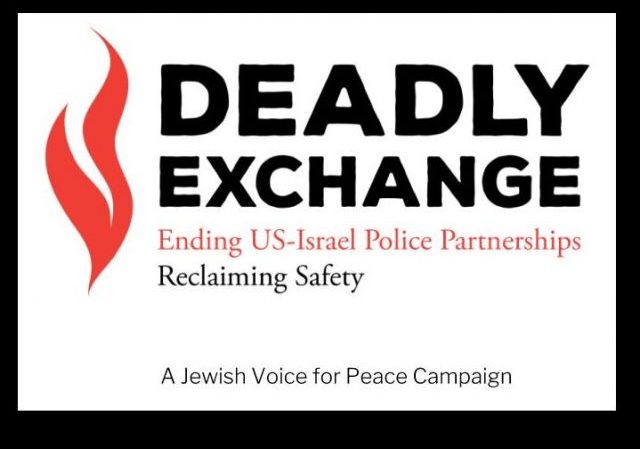Deadly Exchange is the name of a campaign promoted by Jewish Voice for Peace (JVP), a radical, anti-Zionist group that partners with terrorists and anti-Semites, which dishonestly tries to link Israel and American Jews to US police brutality. It vilifies the work of mainstream US Jewish groups like ADL, which offers training trips to Israel for American law enforcement to increase their understanding of extremist and terrorist violence.
Here’s a JVP video promoting their libel:
There is a moneyed Jewish conspiracy to murder innocent Americans? Goebbels would be impressed, @jvplive. https://t.co/dscgxsdVub
— andrew mark bennett (@acandidworld) June 29, 2017
Deadly Exchange alleges that such law enforcement training programmes fuel racist policing practices against minority communities in America and militarises the approach to crime and protests.
It often includes antisemitic narratives that Jewish power and money, through Jewish communal institutions, foment violence and racism against African-Americans. However, as CAMERA and other organisations have shown, the charge is a total lie. In fact, the proponents of the Deadly Exchange smear have never given one actual example tying police officers trained in Israel to any actual incidents of racist-inspired police brutality.
Indeed, ADL’s program is strictly focused on counter-terrorism for senior US police officials. It deals with management and policy issues, not specific tactical training, and doesn’t train beat cops on ordinary police work, such as how to make arrests of regular criminal suspects.
Readers of this blog may recall that, in 2020, Labour MP Rebecca Long-Bailey was dismissed by party leader Keir Starmer from her role as shadow education secretary after she praised an interview with actress Maxine Peake that advanced a Deadly Exchange-inspired allegation.
During the interview in the Independent, Peake falsely claimed that “The tactics used by the police in America, kneeling on George Floyd’s neck…was learnt from seminars with Israeli secret services”. The actress later apologised for her remarks, acknowledging that she was wrong. The Independent issued a correction, noting that the article was “amended to further clarify that the allegation that US police were taught tactics of “neck kneeling” by Israeli secret services is unfounded”.
A subsequent Channel 4 News fact-check similarly found that her allegations were false.
Turning now to the Guardian, which published an article on March 17th co-written by their US correspondent Sam Levine and Alex Kane, a reporter at the anti-Zionist site Jewish Currents, titled “ADL leaders debated ending police delegations to Israel, memo reveals”.
The article’s second paragraph introduces the subject by legitimising the antisemitic criticism:
The ADL…has for years run a program that sends delegations from US law enforcement departments to Israel to “study first-hand Israel’s tactics and strategies to combat terrorism”. The trips have long faced criticism from US civil rights groups, who argue that the trainings could encourage US police to further militarize their forces and exacerbate police violence.
However, our research was unable to find evidence that any legitimate US “civil rights groups” have echoed JVP’s antisemitic criticism of the ADL’s law enforcement training programmes (more on that point later in our post).
Now, to the crux of the story – the Guardian writes:
A draft memo obtained by the Guardian and Jewish Currents shows that amid the George Floyd protests in 2020, two ADL executives questioned whether the trips could make American officers “more likely to use force” and contribute to the “problem” of police brutality
“In light of the very real police brutality at the hands of militarized police forces in the US, we must ask ourselves difficult questions, like whether we are contributing to the problem,” wrote George Selim, an ADL senior vice-president, and Greg Ehrie, VP for law enforcement and analysis, on 9 June in the draft memo. “We must ask ourselves why it is necessary for American police, enforcing American laws, would need to [sic] meet with members of the Israeli military. We must ask ourselves if, upon returning home, those we train are more likely to use force. We hope that that is not accurate.”
However, the article then adds:
Asked about the document this week, Selim said the memo was an “early draft” written before the ADL had made a final assessment.
Selim said he and Ehrie had conducted a “thorough assessment of the program” after writing the draft memo, and that their final recommendation was “to continue the program with updated curriculum and content in order to increase the value and impact of this type of law enforcement engagement”
Selim added that the trips were “paused” due to the pandemic but suggested they could restart: “We remain committed to law enforcement engagement and professional development nationally and internationally and are likely to expand our educational law enforcement programs.”
George Floyd’s murder had prompted the ADL to “ask ourselves tough and probing questions”, Selim said, adding that his review had concluded that the criticisms of the exchange were false: “ADL is proud of its decades of work with law enforcement and believes strongly that those relationships are crucial in helping protect all people from hate crimes and hate-motivated violence. As we said in the memo, the Law Enforcement Leadership Seminars have led to stronger relationships with law enforcement that have directly helped ADL with the investigation of hate crimes and protecting local communities.”
Selim also said the trips were “educational and cultural in nature” – featuring briefings, site visits and meetings with Israeli and Palestinian law enforcement leaders – and that they did not involve “tactical trainings” or teachings about interrogation methods.
So, the entire article is based on a few sentences in an early draft of a memo in which two ADL executives asked questions about their law enforcement training programmes, but ultimately came to the conclusion that those concerns were unfounded.
Later in the Guardian article, we’re told the following:
Activists have protested against the ADL’s Israel trips through a campaign called Deadly Exchange. In 2020, a coalition of activist groups – including the Movement for Black Lives, Jewish Voice for Peace, and the Arab Resource and Organizing Center – also launched a “Drop the ADL” campaign, citing its ties to law enforcement.
First, it seems likely that these radical activist groups compromised by antisemitism are the so-called “civil rights” groups critical of ADL the Guardian mentioned earlier in the piece. Further, it’s telling that the co-authors uncritically cited and linked to the “Drop the ADL” campaign – whose website is full of lies about the respected Jewish organisation, such as this:
[ADL] has a history and ongoing pattern of attacking social justice movements led by communities of color, queer people, immigrants, Muslims, Arabs, and other marginalized groups, while aligning itself with police, right-wing leaders, and perpetrators of state violence
On another page of the StoptheADL website, they defend Louis Farrakhan-supporting anti-Semites such as former Women’s March leader Tamika Mallory, characterise ADL as racist for supporting Israel’s right to exist, legitimise the odious lie that Israel is engaging in “genocide”, describe Israeli security personnel as “Israeli racial supremacist forces” and justify Palestinian terrorist groups as “popular resistance movements”.
In short, the Guardian article promotes the extremism of organisations like JVP which, under the guise of ‘anti-racist intersectionality’, consistently stoke antisemitism by smearing as racist mainstream Jewish organisations. The “leaked memos” amount to a nothing-burger of a story. The main take-away of the article is how the Guardian has again found a way to normalise antisemitism under the guise of ‘mere’ anti-Zionism.
Related Posts
Telegraph deletes debunked claim over Bennett-Zelensky talks





